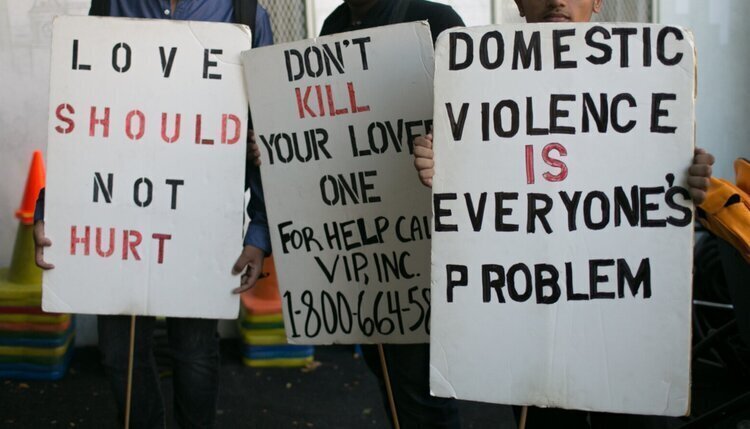Opinion: Domestic and gender-based violence heightens the vulnerabilities of the disability community
/THE ENDGBV VOICES COMMITTEE IS A SURVIVOR-LED GROUP WORKING TO RAISE AWARENESS OF INTIMATE PARTNER VIOLENCE AND ITS IMPACTS. PHOTO BY WILLIAM ALATRISTE/CITY COUNCIL
By Christopher R. Birstler
As someone who identifies as being neuro-diverse and having survived domestic violence I can attest to the added struggles of survivors such as myself. Identifying as a member of the disability community alone poses its increased rates of being mistreated by society. Add in being a survivor of domestic violence and you get a potentially much more difficult situation at play. As a disabled survivor I want to make it clear that our most vulnerable members of society deserve so much better.
What’s utterly disturbing is that the voice of someone who is disabled or perceived as being disabled is somewhat diminished by default, and unfortunately for those with more severe disabilities their voice and cry for help is not as visible as those who function at a higher capacity. Not only is this a significant systemic injustice but it’s also a violation of the fundamental human rights of some of the strongest and most resilient members of society. An additional barrier which I have experienced firsthand is the fear of seeking assistance such as medical or legal help, and advocacy because of one’s disability status and the prospect of being judged and denied for that request for help. An alarming statistic provided by Sanctuary for Families is outlined as follows: “People with disabilities experience higher rates of domestic violence and sexual assault than non-disabled people. 70% of disabled people experience some form of abuse and are three times more likely to be sexually assaulted.”
When you hear the term “ally” what exactly comes to mind? Take a moment and reflect on this. Allies are crucial for vulnerable and marginalized populations. You may ask yourself why such a push for allies. Well, I am here to tell you that as someone whose battled numerous intersectionalities having someone in your corner who not only understands you but has your best interests at heart can feel like the difference of being above or under water. According to Sanctuary for Families: “Because people with disabilities are often isolated and dependent on a small support circle, in nearly 100% of cases, survivors with disabilities experience abuse at the hands of someone they trust.” Let these statistics resonate with you and think for a moment if you personally know of anyone who is disabled. If you reason that you do not know of anyone that is disabled, I respectfully challenge you to think more broadly and understand that many documented and protected disabilities are not visible by others. A common example is a survivor of interpersonal violence who was diagnosed with Post Traumatic Stress Disorder because of what they went through.
Understanding many more people than we realize are living with undiagnosed disabilities, you may ask yourself what can be done to better serve, protect, and advocate for disabled survivors of gender and domestic based violence. Extending empathy, and understanding, providing a sense of security, and affirming that you’re an ally can and will go very far in creating a more equitable, just, and inclusive society for those disabled and not to flourish together as productive and healthy members of society. Something to consider is the fact that LGBTQIA+ and BIPOC survivors with disabilities face additional challenges within the disabled community. I encourage you all to embrace the ethos of a “super advocate” which entails zealously advocating for those who don’t have a voice and ability to be their own best advocate. Something as simple as telling others you work, play, and study with that you have a certain disability or are close to someone who does can not only help build a culture of acceptance and belonging but also assist in building the bridges of a stronger network of passionate allies. As a disabled survivor of domestic violence, I encourage those who are disabled survivors to reach out for assistance and share their stories when and if safe to do so. Below are some organizations that may be able to assist those dealing with domestic and gender-based violence who identify as a part of the disability community:
Mayor's Office for People with Disabilities (MOPD): https://www.nyc.gov/site/mopd/resources/resources.page
The Arc: https://thearc.org/
Crime Victims Treatment Center (CVTC): https://www.cvtcnyc.org
Barrier Free Living NYC: https://www.bflnyc.org/
Disability Rights New York: https://www.drny.org/
End Abuse of People with Disabilities: https://www.endabusepwd.org/
National Deaf Domestic Violence Hotline: https://www.thedeafhotline.org/
From Victim to Victor Inc.: https://www.facebook.com/fromvictimtovictorinc
If you or someone you know is experiencing domestic or gender-based violence, help is available:
Find resources and support in NYC by searching NYC HOPE Resource Directory online at www.nyc.gov/NYCHOPE.
NYC Family Justice Centers offer immediate safety planning, shelter assistance, mental health support, and other resources by phone or in person. For in person services, clients can call 311 for their nearest Family Justice Center to make an appointment or walk in if they cannot engage in remote services safely or effectively.
Call 311 to be connected to the nearest NYC Family Justice Center.
Call NYC’s 24-hour Domestic Violence Hotline at 1-800-621-HOPE (4673) for immediate safety planning, shelter assistance, and other resources, TTY: 866-604-5350.
In an emergency, dial 911.




